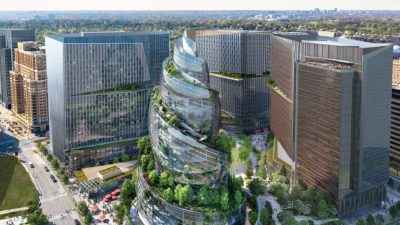
The arrival of Amazon’s east coast headquarters will give Arlington County a boost. Will county officials make Arlington a mental health showplace as well?
(4-14-21) Long-time Advocate Bob Carolla argues today that Arlington County, Va., could become a state and national showplace in providing community mental health care through a host of innovative programs. Will public- private partnerships help achieve the vision?
Arlington, Va–A New Frontier for Mental Health Care?
By Bob Carolla
Looking east, Arlington, Virginia is a gateway to the nation’s capital. Looking west, it is a gateway to a growing high tech economy.
It’s also home to an eternal flame that burns on a hill at the gravesite of John F. Kennedy in Arlington Cemetery: a symbol of the idealism of a New Frontier and an unfinished presidency. Part of his unfinished vision is available, accessible and excellent community based mental health care. Unfortunately the 1963 Community Mental Health Act remains a largely broken promise. Today, we have an inadequately treacherously fragmented, mental health care system that includes a yield of chronically ill homeless persons.
Arlington, where I live, currently is poised to fulfill President Kennedy’s vision. Here’s steps that could help it accomplish that goal.
On Our Way
In December, Governor Ralph Northam signed legislation establishing a statewide “Marcus Alert System” for responding to mental health crises and limiting the role of law enforcement. The system is named after Marcus-David Peters, a 24-year-old teacher shot and killed by a police officer in 2018 during a crisis.
Locally, an Arlington Police Practices Working Group has made over 100 recommendations that include improvements in mental health care.
The county’s Department of Human Services (DHS) is focused on strengthening its Crisis Intervention Center and is taking the lead in establishing:
- a regional crisis call center
- regional adult mobile crisis response
- a regional crisis stabilization unit
The mental health services budget for the coming year includes:
- Expansion of children’s mobile crisis capacity
- A physician’s assistant, psychiatric nurse, and emergency services clinician
- 8 crisis counselors
- Additional peer counselor support
An immediate priority is choosing a successor to the county’s highly-regarded Arlington Department of Human Services (DHS) division chief and medical director, John Palmieri, who recently became senior medical advisor for the U.S. Substance Abuse & Mental Health Services Administration (SAMHSA).
As the county comes out of the pandemic crisis, this momentum needs to be used for an even greater trajectory of investment for transformation of the county’s mental health care infrastructure and treatment capacity for the future.
Creating More Beds
Arlington’s Virginia Hospital Center (VHC) has completed “the big dig“ for a $250 million expansion. Through the county’s approval process, the hospital committed in 2018 to adding a substantial number of psychiatric beds to help alleviate Virginia’s bed crisis, while modernizing the unit’s inpatient environment, providing dedicated space in the Emergency Department for individuals suffering mental health crises and providing intensive outpatient services.
There is potential for greater partnership with VHC in building a county-wide system of coordinated care. The medical community has come to realize that collaborative care for heart disease, cancer treatment and other conditions requires mental health care and support as part of recovery.
Fostering Integration of Primary and Mental Health Care
On March 31, the national Bipartisan Policy Center released long-awaited detailed recommendations for integration of primary and mental health care. The Arlington County Medical Society, VHC Physicians Group, the Privia Medical Group and other local providers have an opportunity to play a leading role in the movement, locally, regionally and nationally.
The impact of the past year’s pandemic on mental health will be with us for a decade or more. New, emerging variances of the COVID-19 virus heighten concern over long-term brain and neurological effects.
Some indications exist that psychosis can be both a symptom and result of infection.
Arlington’s Department of Public Health’s and VHC’s staff members deserve applause as heroes in meeting the pandemic’s difficult challenges and burdens. DHS also deserves praise in continuing to move forward despite those challenges. The same spirit of community mobilization–public and private—also should be used to keep building momentum.
An Advocacy Agenda for the Future
One is the need for a “navigator” to help individuals and families find the right help quickly in a fragmented or bureaucratized system. Some see the need only in terms of navigating through county government offices and programs. Arlington’s CSB is discussing a broader approach: i.e., a well-publicized single navigation entity with detailed knowledge and guidance for both DHS and outside local providers and programs. My personal advocacy position is that it should be contracted-out rather than located inside any one county agency.
Not everyone who confronts mental illness for the first time will qualify for county services. Middle class and affluent families rarely think of the county as their first stop in seeking help during onset, but their overwhelming confusion and distress is equally felt. If we ever want a truly integrated system, Arlington residents have to see it as a whole and a public-private partnership is essential.
The second is the need for a clear, specialized First Episode Psychosis (FEP) program. The county’s evolving practice model is the focus of particular community dialogue in Arlington right now.
First Episode Psychosis: Too Costly In Neighboring Fairfax?
FEP programs focus intensively on youth at risk as well as those who may experience “first break.” Arlington County’s approach so far has been to adapt current services to meet the need. It views wealthier and larger Fairfax County’s FEP program— sometimes cited as a model—as costing too much with high staff-to-client ratios.
Those are legitimate concerns, but “good enough for now” may not be soon enough for specialized care—particularly if upstream prevention is a goal with cost-saving outcomes over time.
An Arlington FEP program certainly deserves much higher priority than some people’s notions of building a scenic gondola between Arlington and Georgetown over the Potomac River.
- Federal mental health block grants to states include a 10% set aside for FEP program grants. While marshaling funds—public or private–the county should prepare a formal written evaluation of current services relative to other models.
- The National Institute for Mental Health (NIMH) for example, has published a two-part outreach and implementation guide for Coordinated FEP Specialty Care. It may be a point of reference for next steps in dialogue with many players—including the Arlington Community Foundation which has been taking an active interest in mental health care issues since before the pandemic.
- One concept to explore: the feasibility of cost-sharing with Fairfax County and/or another jurisdiction for a multi-site system
- A potential resource for guidance is Lisa M. Dixon, M.D. M.P.H, one of the nation’s leading experts on FEP programs, who serves on NAMI’s National Board and its Quality Assurance Committee—and NAMI’s national headquarters is in Arlington.
Arlington and Virginia: A Regional Hub?
In 2019, the National Institute for Mental Health launched an Early Psychosis Intervention Network (EPINET) to foster collaboration, coordination and advancement of best practices. Today the network has eight regional hubs and 101 clinics across 17 states.
The closest regional hub serves Maryland and Pennsylvania through a consortium based at the University of Maryland’s School of Medicine, Johns Hopkins Shepard Pratte, the University of Pennsylvania, the University of Pittsburgh, and both state governments
Virginia is not a hub. Nor part of one. And our needs aren’t the same as Maryland and Pennsylvania
While focusing on the short-term, I would love to see Arlington help lead in exploring establishment of a Virginia-based EPINET regional hub–with direct involvement of the University of Virginia, Virginia Commonwealth University, and Eastern Virginia Medical Schools. Becoming an EPINET regional hub would seem to fit with Virginia’s other leadership trends.
It probably would require private-public partnerships. I’m not shy to drop some hints. Amazon’s HQ2 headquarters will be in Arlington and General Dynamics, headquartered in Fairfax County, has a division dedicated to health care information technology and research. There are others.
Breaking Through to a Higher Level
Is this pie in the sky? It may be hard to digest, but the county has many creative mind. Ideas provide the first small steps toward giant leaps higher and forward.
Two years ago at NAMI’s national convention, I felt instinctively that the mental health movement— 20 years after the landmark U.S. Surgeon General’s Report on Mental Health–was on the verge of breaking through nationally to a “next higher level.“
I have the same instinct about Arlington today
About The Author: Bob Carolla is a member of the Arlington Community Services Board and NAMI Northern Virginia. He has been an advocate on national mental health care policy for over 20 years and is a member of The Stability Network These are his personal views. 



